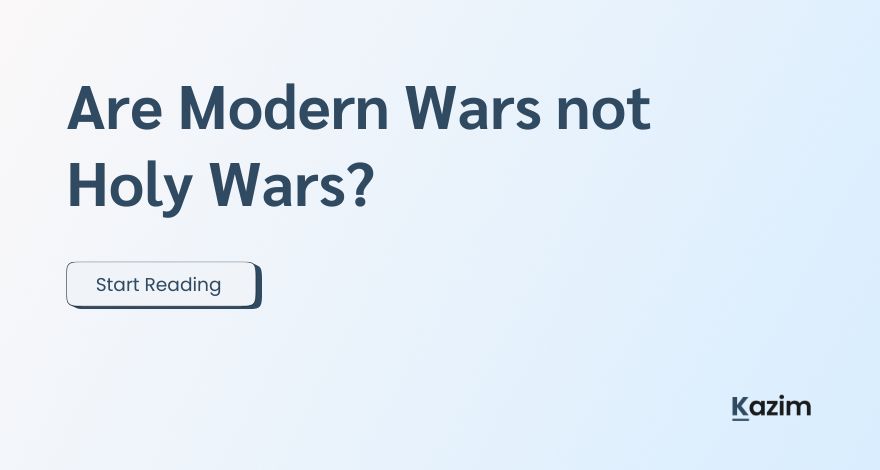The essay “Are Modern Wars Not Holy Wars?” was part of the CSS 2017 essay paper published on Cssprepforum after a rigorous evaluation by Sir Syed Kazim Ali – Pakistan’s leading CSS and PMS English essay mentor – as his expert review ensures structured, exam-focused content for aspirants. Indeed, this essay challenges the misconception that contemporary conflicts are religiously motivated. Instead, it highlights how geopolitical ambitions, economic interests, and ideological power struggles fuel modern wars. Thus, analyzing historical and current conflicts dismantles the notion of religious warfare. And Sir Kazim’s review guarantees a well-researched perspective in the essay pattern, helping students grasp complex global issues effectively.
Main Ideas and Analysis of the Essay
The essay “Are Modern Wars not Holy Wars?”analyzes whether modern wars can be considered holy, ultimately arguing that they are primarily driven by geopolitical, economic, and ideological motives rather than religious ones. While some conflicts use religious rhetoric, their true nature is thus rooted in power struggles and strategic interests.
Understanding Holy Wars and Modern Conflicts
Historically, holy wars were fought with a religious endorsement to defend or spread the faith. However, modern wars differ significantly, shaped by territorial ambitions, security concerns, and economic benefits rather than genuine religious causes. Hence, while some factions claim religious justification, their actions often contradict their proclaimed beliefs.
Why Modern Wars Are Unholy
1-Geopolitical Domain
This essay highlights that modern conflicts are primarily driven by geopolitical dominance. For instance, World War I was fought to assert power in Europe rather than for religious purposes. Thus, this demonstrates that wars are waged for territorial expansion and political control rather than spiritual causes.
2-Economic Domain
Moreover, economic gains often drive warfare, as seen in the Iraq War (2003-2011), which many argue was fought for oil rather than democracy. Hence, this underscores how material interests overshadow any religious justifications for war.
3-Political Domain
Additionally, ideological conflicts have fueled wars, such as the Vietnam War (1955-1975), which was a battle between communism and capitalism, thereby proving that ideological divisions, rather than religious devotion, are central to modern warfare.
4-Security Domain
Lastly, security concerns led to wars, as demonstrated by the Six-Day War (1967), where Israel launched a pre-emptive strike against its neighbours. This confirms that nations thus prioritize self-defence and strategic dominance over religious considerations in conflicts.
Are Some Modern Wars Holy?
Some scholars claim that religious elements in conflicts make them holy wars. However, the essay refutes this notion, which argues that political and territorial interests overshadow religious motivations. For instance, Israel’s occupation of Palestinian territories, as reported by Amnesty International in 2022, is more about demographic control than faith.
Similarly, terrorist groups justify violence using religion, but their actions – war crimes and human trafficking – thus contradict their supposed religious principles.
In conclusion, the essay emphasizes that modern wars are unholy, driven by power, economy, and ideology rather than religious devotion. While some conflicts use religious rhetoric, their core motivations hence lie in strategic interests, proving modern warfare is far from holy.
Why Is the CPF Website the Best Choice for You?
Success in CSS and PMS exams is not about hard work alone but smart strategies, precision, and mastering the right techniques. Unfortunately, most aspirants waste valuable time on outdated and unstructured essays available on unreliable websites. This is why CSSPrepForum (CPF) is the ultimate choice for those who refuse to settle for mediocrity and aim for top-tier results.
The key factor that sets CPF apart is Sir Kazim’s approved content. Unlike other platforms that provide unverified essay content, CPF ensures that each essay undergoes a rigorous review process by Sir Syed Kazim Ali, especially before it reaches students. And Sir Kazim mostly gets these essays written by his CSS and PMS-qualified students so that the aspirants can get real-time blueprints of coherence, articulation, and perspectives. Hence, the quality assured material is the guarantee of CPF, making aspiring candidates relax from the market’s manipulation.
Moreover, this is not the only feature of CPF; the website provides many other power packs to aspiring candidates. Indeed, it goes beyond teaching students how to think like a top scorer. Many aspirants memorize essays without understanding the logic and structure behind them, leading to failure when faced with an unexpected topic. Thus, CPF solves this problem by providing deep analytical insights, practical writing techniques, and personalized feedback, ensuring that students don’t just copy essays but create their own with confidence.
While most CSS and PMS preparation websites rely on stagnant, repetitive content, CPF continuously evolves. It updates essays, integrates the latest trends, and provides exclusive guiding insights in blogs, helping students stay ahead in a competitive environment. Hence, CPF’s content aligns precisely with what examiners expect, giving students the best possible advantage.
For serious CSS and PMS aspirants, CPF isn’t just another website; it’s a roadmap to excellence. It empowers students, sharpens their writing abilities, and provides them with the most comprehensive essay-writing guidance in Pakistan. If you want to rise above the competition, CPF is the only place to be.
Click the button below to start reading the complete essay.

